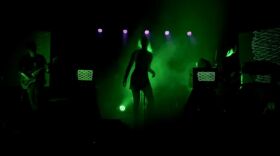Rufus Wainwright doesn’t just mark anniversaries, he turns them into orchestral events. Fresh off a performance in Louisville with the Louisville Orchestra, Wainwright is using the 20th anniversary of Want One and Want Two as a chance to remind everyone just how baroque, brilliant, and beautifully extra he’s always been.
“I’m still celebrating it,” he told me, “and I don’t think there’ll be that much more to celebrate until, you know, my wedding anniversary or something.” He laughs, but he’s not wrong—Want is the kind of maximalist art-pop opera that only gets more delicious with time.
Wainwright talked about his early trilogy of albums like they were stages of human evolution. “First album, boyhood. Second, decadence. Third, I became a man,” he said. The Want albums were that third stage, coming out of addiction and into clarity. “I wrote a lot of the songs before and during that whole debacle,” he admitted. “But then once I got into the studio, I was pretty clear.”
That clarity allowed him to go full symphonic drama—“valiant knight on Want One, the Lady of Shalott on Want Two”—and this current orchestral run, he says, is how it always should’ve sounded. “Even though we worked with great musicians and Marius de Vries on the originals, the vision was always orchestral,” he said. “With Marius, he thought it was fantastic. He would just sit there and lay it on me.”
Not everyone agreed in the early days. Wainwright doesn’t name names at first, but eventually drops the dime: Jon Brion and Pierre Marchand. “Great producers. Awful people,” he said with a smirk. “They always made me feel really bad about wanting to be this grand, Baroque, musically big person. Which I am.”
It’s not a grudge. It’s a shrug. “They were probably right in some cases, in terms of editing my flamboyance. But also: fuck that.”
He’s happy to be out of the traditional music industry loop—even though he lives smack in the middle of it. “I live in LA, the belly of the beast. And I’m prone to fall into that cycle, chasing the carrot. It’s horrifying,” he said. “The music business has become so vapid and predictable. And the songs are really kind of at the bottom of the equation.”
So he writes operas, composes oratorios, and releases albums like Folkocracy—a not-at-all-casual flex across genres. “I just love a great melody,” he said. “And I like to challenge myself. I mean, there are incredible artists who pull out the same thing over and over. I’m really jealous. They make so much money off it.”
But don’t mistake him for bitter. He’s too busy being amused. Like when he talks about his daughter’s love of Taylor Swift. “It’s fascinating,” he said, playing diplomatic dad. “There’s a lot I could never even dream of accomplishing there. But after I drop her off at school, I put on the Met Opera channel and cry in the car to Aida.”
He’s composed operas (Prima Donna, Hadrian), soundtracked his own grief, and become the poster child for artful resilience. But he’s still most interested in making you feel something, whether it’s through a sweeping aria or a folk tune disguised as a torch song. “I like stuff that makes you cry, and moan, and shake,” he said.
Which, let’s be honest, is more than you’re getting from most of the vapid, carrot-chasing business he still calls home.
Watch the interview above and then check out the video below.





